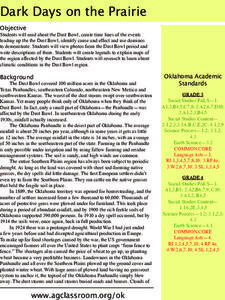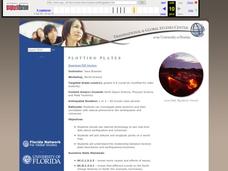Curated OER
East Asia Country Project
Get your young historians thinking about East Asian culture and history during this partner research project, in which they analyze a variety of East Asian aspects to prepare for a presentation. After an initial "what do we already know"...
Curated OER
Religions of the World
Second graders explore the part that religion plays in a culture. They explore how many different religions there are in the world and where they're located.
Curated OER
Canada, O Canada
Students study the similarities and differences between Canada and the United State in this unit. They examine geography, government and culture as they "travel" through Canada.
Curated OER
Aerosol Lesson: Science - Graphing SAGE II Data
Learners examine and plot atmospheric data on bar graphs.
Curated OER
Children's Literature Across the Curriculum Ideas-Dancing With the Indians
Students read Dancing With the Indians by Angela Shelf Medearis. They complete a variety of cross-curricular activities surrounding the study of Native American festivals and traditions. Included are reading, art, math, science, writing,...
Curated OER
Dark Days on the Prairie
Fourth graders research the location and causes of the Dust Bowl in 1935. In support, they interpret photos from that period in Oklahoma history, They also compare/contrast the American Dust Bowl to the dust storms that occurred in...
Curated OER
Dark Days on the Prairie
Students explore U.S. geography by researching agriculture. In this dust bowl activity, students complete a cause and effect worksheet based upon the dust bowls that covered a large portion of Oklahoma and Texas in the early 1900's....
Curated OER
First Nations Contributions
Sixth graders investigate point of view of a Native and a Missionary by reading articles by each. In this Native Person versus Missionary lesson, 6th graders look at the contributions of the Atlantic First Nations. Students role play...
Curated OER
Volcanoes
Second graders review the characteristics and aspects of volcanoes. Using this information, they write a creative story and draw illustrations to accompany the words. They use geographical terms to describe a location and the physical...
Alabama Learning Exchange
Coral Reefs
Study explore coral reefs. For this coral reef lesson, 4th graders examine the physical structure of coral reefs. Students consider why coral reefs need to be protected and ways to protect them.
Curated OER
Aboriginal Societies of Canada
Fourth graders study Aboriginal Societies in Canada and do an oral presentation to the class.
Curated OER
Ten Characters from American Folklore
Students read short stories about ten characters from American folklore. They match a statement about each character with the correct character. They then rewrite one of the ten stories in their own words (optional).
Curated OER
Worksheet #10: Transportation and Communication
In this transportation and communication instructional activity, students answer short answer questions about transportation and communication for the county they live in. Students answer 5 questions.
Curated OER
Refugees
Sixth graders use the internet as well as personal interviews to research refugees and refugee status from a Canadian and international perspective.
Curated OER
Children's Literature Across the Curriculum Ideas-In The Small Small Pond
Learners read In The Small Small Pond by Denise Fleming. They complete a variety of cross-curricular activities surrounding the study of the pond ecosystem. Included are reading, art, math, science, writing, social studies, and library...
Curated OER
Gold Rush Abolitionists: How different was the role of Spanish-speaking blacks under Mexican rule from the role of English-speaking blacks under U.S. rule?
Students determine how Spanish-speaking blacks and English speaking blacks were treated differently. In this emancipation lesson plan, students compare the Mexican and American rules regarding slavery.
Curated OER
Discovering the Oregon Trail
Students explore U.S. history by researching the Oregon Trail. In this American exploration instructional activity, students read the story On the Shore of the River and define the exact path early settlers took to find the state of...
Curated OER
Plotting Plates
Students investigate plate tectonics and their correlation with natural phenomena like earthquakes and volcanoes. They use the internet to see real-time data about earthquakes and volcanoes. Students plot latitude and longitude points on...
Curated OER
A Fish Story
Young scholars closely examine and analyze an American tall tale. They find the key features of a tall tale and compose a tall tale of their own. Student groups write, edit and present their tales to the class.
Curated OER
Solid Waste and Recycling
In this unit of lessons, students examine solid waste and recycling. They examine the relationship between Native Americans and land. They also decorate bags in which they discover the concept of decomposition.
Curated OER
Discovering the Oasis
Students focus on the types of vegetation and animal life living around local water sources. This lesson plan can be adapted to any local water source, whether it be a lake, a river, stream or ocean. It has a particular focus on the...
Curated OER
An Arctic Expedition
Young scholars become familiar with the Arctic region and the difficulties of scientific research by designing and developing an expedition to an "unknown" place. They use the library and the Internet in order to do their research. ...























